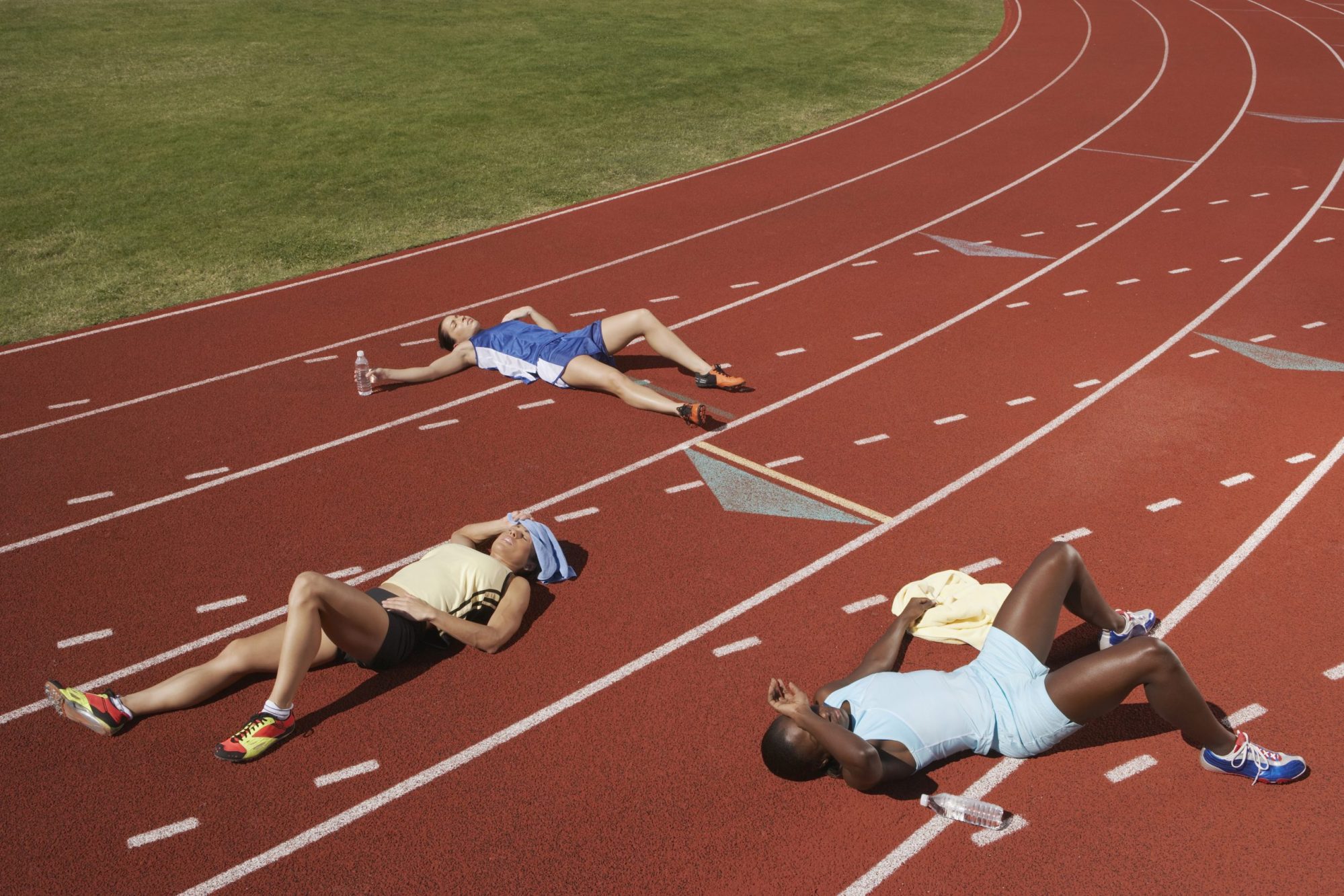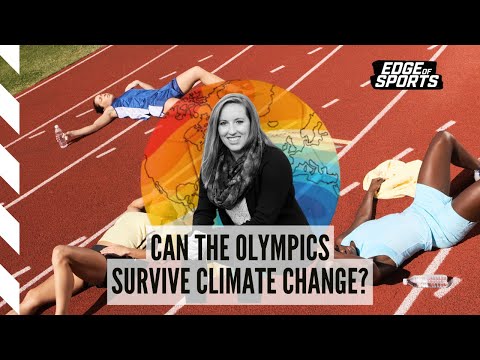The Olympics weren’t the only place new world records were set this summer. Across the globe, sweltering temperatures shattered previous climate records. As the climate crisis continues, these new records will only be broken time and again. The impact is already being felt on the world of sports, and the effects will only become more acute with time. Climate and sports scholar Dr. Madeleine Orr speaks with Edge of Sports from the streets of Paris to discuss what the future of sports, and the Olympics, could look like in a rapidly warming world.
Studio Production: Jules Boykoff
Post-Production: David Hebden, Adam Coley
Transcript
The following is a rushed transcript and may contain errors. A proofread version will be made available as soon as possible.
Dave Zirin:
Hey, this is Dave Zirin, here at Edge of Sports TV, only on The Real News Network, coming to you from Olympic Paris. Thrilled to have with me on the show someone who’s been on in the past and we all know the number, she did great, and so we’re thrilled to have her back on with us. Madeleine Orr, author of Warming Up: How Climate Change is Changing Sports. Madeleine, thank you so much for talking to us here in Paris.
Madeleine Orr:
What a city, and I’m happy to be here.
Dave Zirin:
That’s awesome. That train is going by right now, and that just makes this more authentic. So Madeleine, real quick, just give us a sense of the main thrust of your book, please.
Madeleine Orr:
So my book is about what happens when climate change starts to impact the sports we love, whether it’s the athletes, the events, the teams, the venues, and we’re starting to see that. We’re seeing it in the Seine this week. The water quality is still gross. The air quality has been very mediocre in Paris the last few days. The heat is noticeable. We’re starting to get some hot days. Today was pretty hot. It’s only going to get hotter from here. So we’re seeing those impacts happen and we’re seeing it not just in summer sports, but winter sports as well, and pro sports around the world.
Dave Zirin:
Wow. So based on everything we’re seeing in Paris, the big question, can the Olympics be environmentally sustainable?
Madeleine Orr:
So Paris is a spectacle, and if you walk around the city right now, you might notice that there are streets blocked off. There are entire sections where you can’t approach. We’re on a street right now that is blocked off to cars and there is gendarmerie, the police, standing at the edge, making sure you can’t get in here. So massive disruption, and that’s because they’re bringing in 15 million tourists, and on top of 15,000 athletes and all of the staff and volunteers. So you can imagine there’s no version of bringing that many people to one place, for what’s functionally a big party, that’s going to be sustainable. That’s an oxymoron. A sustainable Olympics is an oxymoron and the model is completely untenable. They’re not going to be able to continue to do it for much longer.
Dave Zirin:
Well, our show is based in the United States and of course 2028, the Olympics go to Los Angeles. What message do you have via sustainability for people in LA?
Madeleine Orr:
If you live in LA, please get public transit. Get on them for public transit, it’s the best thing you can do, not just for your city, for yourselves, for your well-being, for your health, for your community, but also for everyone who’s going to inevitably descend on Los Angeles. Second thing you want to do is pressure them to have tickets for locals. Make sure they sell you tickets first. And when they do that, we can lower the number of international tourists that descend, and that reduces that carbon footprint. So that would be number one and two. Keep holding them to their promises. They said they’d have a sustainable games. It’s not possible to do that, but you should hold them to every promise they’ve made in terms of the little stuff, the bus lanes, the bike lanes, the pedestrian areas, all this stuff. Make them do it.
Dave Zirin:
Wow. Now I want my audience to know that you’re not just somebody who writes books, not just somebody who is a university professor, but you’re actually connected with a lot of these athletes who are dealing with political issues, and also with the issues of how they manage environmental catastrophe and world-class sport. I know, I’m not going to ask you to name names of the athletes who you’ve been speaking with, but can you speak a little bit about that work?
Madeleine Orr:
Sure. So in the last three, four years, there’s been groups of athletes organizing behind closed doors. So in Zoom calls, and LinkedIn groups, and WhatsApp groups, trying to figure out how do we take on the powers that be and get our message heard on things like sustainability, on things like racism, on things like Palestinian liberation. And those efforts are really interesting and beautiful to see. Now, it’s not easy for athletes to do that if, for example, they compete for a team like USA whose government is aligned strategically with Israel and has been supporting Israel, or Canada, where I come from, one of the big sponsors and they’ve just extended for eight years is Petro-Can. So very hard to talk about sustainability in that context.
Dave Zirin:
Wow.
Madeleine Orr:
So what’s happening there is they’ve solicited, I guess, a few of us academics to help them on the backend, fact check their messaging, support them in how they’re going to talk about it, and make sure that they feel confident when they go and create their activist work.
Dave Zirin:
Wow. Do you see a day in the near future where an Olympics are called and they quite literally cannot happen because of the climate?
Madeleine Orr:
I think that’s going to happen on the winter side sooner than we think.
Dave Zirin:
Wow.
Madeleine Orr:
I think we’ll get through in the next couple rounds, but if they don’t start really culling where they’re going to go, we are going to see places be too hot to host the Winter Games. And on the summer side, 2016 study out of the UK said, “Actually there’s maybe a dozen cities across the Northern Hemisphere that will be tenable to host the games by mid-century if it continues to be in July and August.” So we’re either going to see a scaled down games or we’re going to see a games in the shoulder season, so not summer as we know it, but a May, June, or a September, October, or we’re going to see them go away. Something’s got a give.
Dave Zirin:
Staggering. I know you’ve done a lot of media, but do you feel like the message that you have is getting out there and is part of the conversation around the Olympics? It seems to me it’s the question, will we have an Olympics? Only if we’re in some way heal the planet and radically refigure what we mean by international sports competition. Do you feel like this is a discussion, a debate that you’re seeing in the broader media landscape?
Madeleine Orr:
I think every Olympics has the discussion, right? There’s a discussion every time. In Rio it was inequality and then it was Zika virus. In Tokyo it was COVID, and here I think we’re finally having a conversation about sustainability. Is it as robust a conversation as I would hope we’re having in public? No, it’s still a lot of greenwashing, but it’s starting to be on the tip of people’s tongues. We’re starting to talk about what’s this going to look like in the context of a world on fire? And it’s important that we have that conversation, that we ask those questions, that we keep pushing the organizers.
Dave Zirin:
And then just the last question is about greenwashing. I’m hoping you can explain what that means-
Madeleine Orr:
Sure.
Dave Zirin:
… in the context of the sustainability message that comes from the International Olympic Committee.
Madeleine Orr:
Yeah. So there’s two versions of greenwashing at the Olympic level that are really nefarious. The first one is, they will tell you that these are a sustainable Olympic Games and, y’all, that’s not possible. It doesn’t exist. So they’re labeling things as sustainable because really there’s nobody to tell them not to, so they’re just using it. The other thing they do is they use a lesser of two evils argument. And this is also really pretty nasty, where they’ll say, “Oh, well these other Olympics in the past had a carbon footprint of X. We aren’t going to have that.” Well, that doesn’t mean your games are suddenly sustainable because it’s slightly better than that other thing. The bar for these things, frankly, is on the floor. And so any action is good and we want to see more of it, but you can’t jump from awful to slightly less awful and all of a sudden call it good.
Dave Zirin:
Her name is Madeleine Orr, she’s the author of Warming Up: How Climate Change is Changing Sports. If you care about the future of sports, this is a book you have to read. Madeleine Orr, thank you so much for joining us here on Edge of Sports.
Madeleine Orr:
Thanks for having me.



